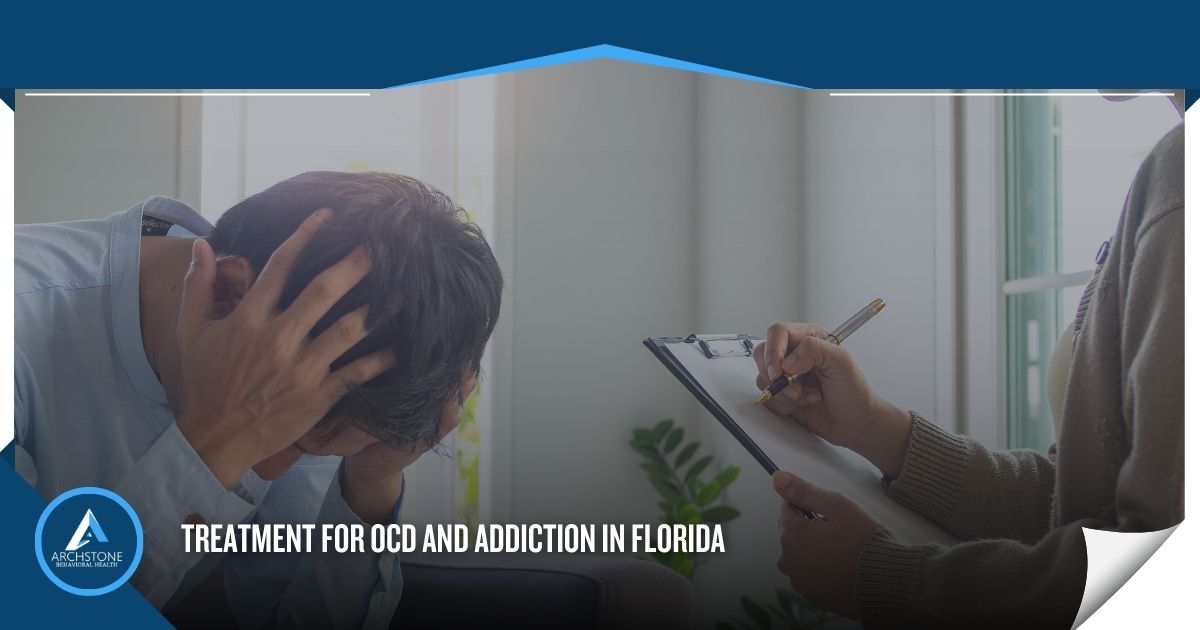Treatment for OCD and Addiction in Florida
Get Help Now
Addiction is a complex condition that can keep people from living full, healthy lives. Research shows that up to half of all people with a substance use disorder (SUD) also live with a mental health condition.
Obsessive-compulsive disorder (OCD) is a mental health condition that may complicate addiction treatment. Understanding OCD can help you seek the correct type of substance abuse treatment.
This article will explore what OCD is and how to recognize it. You will learn about the link between OCD and addiction and where to find effective treatment programs in Florida.
Contact the Archstone Behavioral Health specialists now to learn about our OCD and addiction treatment programs. Our intake staff can answer your questions, verify your insurance, and schedule an intake appointment.
What is Obsessive-Compulsive Disorder (OCD)?
TV shows and movies often portray characters who live with OCD. However, these examples do not always represent what obsessive-compulsive disorder is like for the millions of people living with the condition.
Obsessive-compulsive disorder causes symptoms that disrupt people’s lives and ability to function. Here is an overview of common OCD symptoms.
Obsessions
People with OCD may become hyper-focused on thoughts or ideas. Some examples of common obsessions include:
- An intense fear of contamination, illness, or germs
- Excessive fear about other people dying from injury or illness
- Unwanted, intrusive thoughts about sexual behaviors
- Thinking a lot about religious ideas or becoming focused on “sinful” thoughts
- Intrusive, violent thoughts about self or others
- Focusing on “good” or “bad” numbers
People with OCD often struggle with obsessive thoughts. In many cases, obsessive thoughts can lead to compulsive or repetitive behaviors. The compulsive behaviors of OCD may be similar to compulsive behaviors in addiction.
Individuals with OCD may have higher stress levels because of their intrusive or disturbing thoughts. These thoughts may lead to disruptive or destructive behaviors.
Compulsions
Compulsions are behaviors or actions people with OCD feel they “must” do. Some examples of common compulsions include:
- Frequently “double-checking” to make sure doors are locked, lights are off, etc.
- Praying frequently because of religious fear
- Tapping, repeating words, counting, and other repetitive actions to reduce anxiety or stress
- Hoarding items
- Excessive cleaning or hand washing
One of the criteria mental health specialists use to diagnose OCD is how time-consuming a person’s behaviors are. People must engage in obsessive or compulsive behavior for at least one hour each day to receive an OCD diagnosis.
Understanding the Connection Between OCD and Addiction
Research shows a strong connection between obsessive-compulsive disorder and addiction. About 25% of people in treatment for OCD also meet the criteria for a substance use disorder. But why are these conditions linked?
Living with obsessive-compulsive disorder can be emotionally and physically exhausting. People with OCD may spend hours a day performing repetitive behaviors or rituals. The stress of obsessive, intrusive thoughts can become unbearable.
Without treatment for OCD, some people will turn to drugs or alcohol for relief from their symptoms. Mental health experts refer to this as “self-medication”.
Self-medicating with drugs or alcohol can provide temporary relief from the stress and anxiety of living with OCD. However, people who self-medicate are more at risk of developing a life-threatening addiction.
Mental health experts also believe that addiction and OCD share some similar symptoms. People with OCD struggle with obsessive and compulsive thoughts in the same way people with addiction do.
Treating OCD and addiction can be challenging. However, specialized, comprehensive treatment programs can provide the therapies and support people need to overcome these complex conditions.
Treatment for OCD and Addiction in Florida
When someone lives with obsessive-compulsive disorder and addiction, they must receive treatment for both conditions at the same time. Florida treatment programs for mental illness and addiction offer comprehensive support that can help people recover from both conditions.
Here is an overview of what to expect during treatment for OCD and addiction.
Assessment
Tailored treatment is essential to long-term recovery success. Before beginning a rehab program, a doctor or addiction specialist will evaluate your needs. Your evaluation will include questions about your substance use, a medical and mental health history, lab testing, and more.
Participating in this assessment will allow your treatment team to develop an effective plan and provide the best possible care.
Detox
Many people begin their recovery process in a medically assisted detox program. During detox, medical and mental health specialists will monitor your needs. They will provide treatment, including medications and emotional support, to keep you safe and comfortable during detox.
Treatment
After completing detox, you will continue treatment in a comprehensive program. Your individualized treatment plan may include:
- Individual therapy
- Behavioral therapies, including cognitive behavioral therapy (CBT)
- Group therapy
- Family therapy
- Medications, including serotonin reuptake inhibitors
- Relapse prevention education
- Nutrition support, exercise, mindfulness, and other holistic therapies
- Aftercare planning
Treatment aims to help individuals cope with obsessions and control compulsions, both regarding engaging in OCD behaviors and using drugs or alcohol.
Find Treatment for OCD and Addiction in Florida Today
If you or someone you love struggles with OCD and addiction, you are not alone. Effective, holistic treatment is available at Archstone Behavioral Health.
Contact our team of specialists now to learn about addiction recovery or to schedule an intake appointment.
